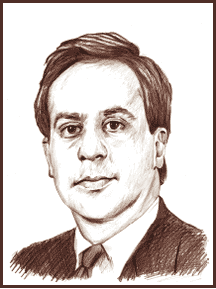INTERVIEW
At The Start Of Our 20th Year, We Ask:
What Is The Future Of Trading?
The trading exchanges have been going through various changes lately, shifting from member-sponsored entities to for-profit organizations. They are also introducing more products, giving us a greater array to choose from. What does this portend for the trading industry? To find out, STOCKS & COMMODITIES Editor Jayanthi Gopalakrishnan spoke with Bob Fitzsimmons of the Nasdaq LIFFE market, David Prosperi of the Chicago Board of Trade (CBOT), and William J. Rainer of the joint venture of the Chicago Mercantile Exchange (CME), the Chicago Board Options Exchange (CBOE), and the CBOT, formally named OneChicago, LLC. Here's what they had to say.

"The fact that we don't have to support an open outcry market allows us to be more streamlined and the fact that we're able to leverage off Nasdaq and LIFFE will hopefully translate to a more streamlined organization."
Bob Fitzsimmons was most recently with Nasdaq's former parent, the National Association of Securities Dealers. Prior to that, Fitzsimmons was a managing director at Nomura Securities International, running its futures business. He started the futures division for Nomura in 1990, and within three years, the division was one of the top 20 futures commission merchants (FCMS). Before joining Nomura, he was a broker in the Treasury bond options pit for Kidder, Peabody & Co.
Fitzsimmons became a member of the CBOT in 1987, and was a member of the CME. He was an active member participant on FCMcommittees at both exchanges.
Since this issue starts off our 20th anniversary year, I wanted to talk about some changes that are taking place in the exchanges and how they're going to affect us in the future. The Nasdaq LIFFE market is a relatively new market and offers traders a new product. Could you start off by giving us background?
As you know, the Nasdaq LIFFE market is a new, highly capitalized, for-profit company. We're trying to leverage off the relationships that Nasdaq would have on the broker-dealer side, and the relationships the LIFFE would have on the FCM side and their product expertise. When the Nasdaq hired me about two and half years ago, they were looking at the futures business, and they brought me in for that effort. We looked at a variety of systems and venues for getting into this business, and we were intrigued by LIFFE and the LIFFE-Connect system. Last March, we were able to finalize a deal with Liffe. Nasdaq and LIFFE really don't compete in the same space, so that makes them more complementary as opposed to competitive.
David Prosperi is the senior vice president and assistant to the president at the CBOT. He is a member of the exchange's management committee, and has management oversight responsibilities for the communications and human resource functions at the exchange.
Prosperi joined the exchange in May 1990 as vice president of communications before moving up to senior vice president of communications. In that role, he was responsible for developing and implementing proactive strategies for the exchange's media relations and corporate and community affairs efforts, as well as serving as the primary spokesperson for the CBOT.

"We're working on becoming more of a product-driven organization. We're focusing on developing new products as well as what we can do to strengthen our existing product mix."
Could you give me some idea of what the Chicago Board of Trade has in mind to offer to traders in the future?
The Board of Trade is in the midst of restructuring into a for-profit operation. We have our restructuring strategy before the SEC, and we're hopeful they will approve it shortly. And should our membership approve it, then it will require a favorable tax ruling from the Internal Revenue Service that transferring from membership to shareholder is a nontaxable event. Restructuring into a for-profit entity gives us a better opportunity to operate in a businesslike environment at the Board of Trade, and allows us to be more competitive, not only with exchanges like the CME, but our foreign competition and the over-the-counter market as well. That's one of the things that we are doing.
William Rainer served as chairman of the CFTC from August 1999 until early 2001. Under his leadership, the CFTC embarked on unprecedented regulatory reform, including support of the Commodity Futures Modernization Act of 2000, which allows the introduction of single-stock futures later this year. Prior to his CFTC appointment, Rainer was chairman of the US Enrichment Corp. from 1994 until 1998.
Rainer's securities industry experience includes having cofounded Greenwich Capital Markets in 1981, where he served as managing director of the firm until 1987. Earlier, he held positions at Kidder, Peabody & Co., including manager of corporate bond trading and director of fixed-income marketing.

"I don't think anybody knows for sure what will happen if these instruments are successful."
Could you give us some background about the joint venture of the Merc, the CBOE, and the CBOT?
Sure. Last May the three exchanges - Chicago Mercantile Exchange, Chicago Board Options Exchange, and the Chicago Board of Trade - decided to pool their resources to form an independent joint venture and provide the resources necessary for the joint venture to become a regulated exchange, specializing in the products legalized by the act, specifically single stocks and narrow-based indexes.
...Continued in the January 2002 issue of Technical Analysis of STOCKS & COMMODITIES
Excerpted from an article originally published in the January
2002 issue of Technical Analysis of STOCKS
& COMMODITIES magazine. All rights reserved. © Copyright
2001, Technical Analysis, Inc.
Return to January 2002 Contents